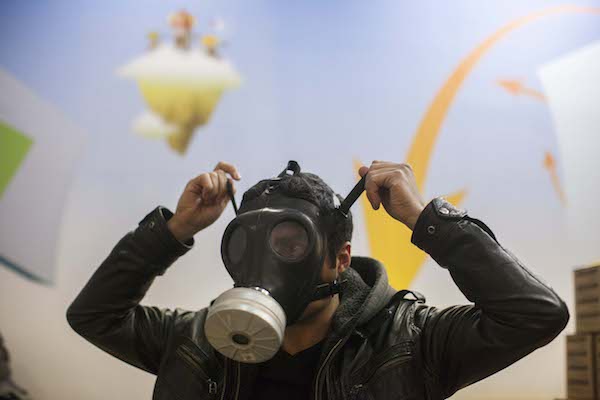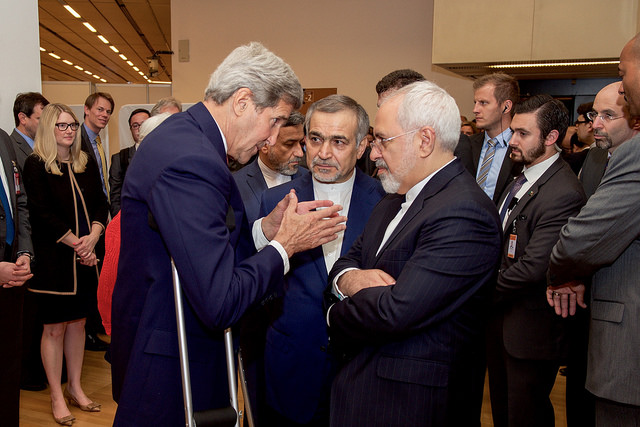Even though Syria still has chemical weapons at its disposal, Israel should ratify the Chemical Weapons Convention. Doing so would not affect its deterrence, and would give it greater sway in the global diplomatic arena.
By Shemuel Meir

At the end of April 2017, the French foreign minister published a French intelligence report that concluded with a high degree of certainty that Assad used the deadly nerve gas sarin in the Syrian air force’s chemical weapons attack on Idlib on April 4, 2017. Close to 90 civilians were killed in the attack. Within two days, the U.S. fired Tomahawk cruise missiles at the Syrian base from which the Syrian attacks were made. The U.S. thereby drew a line in the sand: its intention to enforce the ban on the use of non-conventional weapons.
It is worth looking back at how the U.S. arrived at this point. In the summer/fall of 2013, in a joint initiative unprecedented in international relations, U.S. President Obama and Russian President Putin forced Syrian President Assad to join the Chemical Weapons Convention and to dismantle his massive chemical weapons arsenal. Assad signed the CWC in September 2013 and the dismantling of his chemical weapons arsenal was completed by June 2014.
The Israeli assessment assumes that Assad has not returned to the development of chemical weapons. In an April 19 briefing to military correspondents, senior IDF officials said that it was a case of “residual capability” of the old arsenal that had been hidden and not reported on. Out of a huge store of chemical weapons, only “two to three tons” remained. In a special interview (28 April 2017) for Independence Day, a senior military intelligence officer confirmed that the intelligence assessment that the majority of the chemical weapons arsenal had been dismantled “stands firm” and that of the 1,300 tons that Assad possessed, “a tiny percentage was left, meaning a few tons.”
The U.S.–Russia agreement for the immediate dismantling of Syrian chemical weapons affected Israel. With the disappearance of the chemical weapons threat, the Israeli government decided in the summer of 2014 to cease the distribution of gas masks. This decision was not changed following the April 2017 attack on Idlib, which brings us to the question the impact of the agreement in the diplomatic strategic sphere, and to a reexamination of the question of Israel joining the CWC.
In spite of the dismantling of Syria’s chemical weapons arsenal, Israel decided to continue with its previous doctrine of ambiguity and not to ratify and thereby become a full member of the CWC, which prohibits the production, possession and use of chemical weapons, as almost all countries in the world (192) have done. In response to a question from a Haaretz correspondent (September 12, 2013) following the dismantling of Syria’s chemical weapons arsenal, a Ministry of Foreign Affairs spokesperson said that “Israel will not ratify the CWC as long as other countries in the region which do not recognize [Israel’s] existence and which threaten to destroy it possess chemical weapons.” The spokesperson added that “the threat of the use of chemical weapons against Israeli citizens is not theoretical or distant.”
The Ministry of Foreign Affairs’ response is puzzling, and not in line with the facts. In the Middle East, only Israel (which signed the CWC but did not ratify it) and Egypt (which did not sign it but with whom Israel has a peace agreement) remain outside the international norm of non-use of chemical weapons. Iran and the rest of the Arab states ratified and became full members of the CWC and do not possess chemical weapons. It is therefore unclear exactly which Middle Eastern states in possession of chemical weapons are threatening to destroy Israel. Nevertheless, there was a change in tone in the prime minister’s response to the Syrian chemical attack on Idlib and his welcoming of the U.S. Tomahawk attack.

It is no trivial matter for the Israeli prime minister to speak in a positive manner about a global disarmament convention. In his opening remarks at the April 9 weekly cabinet meeting, Netanyahu stressed the 2013 international commitment to dismantle Syrian’s chemical weapons arsenal in the framework of U.S.-Russian cooperation and called for the international community “to complete the work.”
Did Netanyahu feel that it would be difficult for Israel to continue with its old arguments for not joining the CWC following the dismantling of the Syrian chemical weapons arsenal and the de facto application of a chemical weapons-free zone in the Middle East? Did he feel that the nuclear agreement with Iran (Joint Comprehensive Plan of Action), and reconfirmation of Iran’s position in the Non-Proliferation Treaty (NPT) as a Non-Nuclear Weapons State (NNWS), was liable to turn the spotlight on Israel’s avoidance of membership in global treaties on non-conventional weapons disarmament?
It would be worthwhile Netanyahu adopting the position that former President Shimon Peres well understood — the dismantling of Syria’s chemical weapons arsenal created a new regional and global situation. In international forums, it will now be difficult for Israel to successfully deflect pressure on the nuclear issue. President Peres understood that it was necessary to act on the question of disarmament in order to provide the U.S. with convincing arguments — for example joining the CWC — which would help the U.S. assist Israel in deflecting or softening negative initiatives regarding Israel.
President Peres was a lone voice at a 2013 press conference in The Hague (the home of the CWC), when he called for Israel to favorably consider the U.N. Security Council’s call for all countries to join the CWC now that Syria had joined. President Peres then said that he was sure the Israeli government would consider the option seriously and would ratify the CWC (Kol Israel Radio September 30, 2013).
Peres’ call remained unanswered by the Israeli government. But the issue is likely to resurface in the near future. A series of preparatory meetings for the 2020 NPT review begins in 2017. This will be the largest and most important review in the NPT’s history and marks its 50th anniversary.
If Israel were to join the CWC this would increase, rather than detract, from its freedom of action in the global diplomatic arena. Since its 1993 signature of the CWC, Israel has been to abide by the convention in good faith. The military operational benefit of chemical weapons is low. Military planners around the world have understood that chemical weapons should not be seen as deterrent weapons, and that they can therefore be easily conceded. Those who thought that chemical weapons were “the poor man’s nuclear deterrent” were wrong.
Giving up the chemical option through ratification of the CWC would also not harm Israel’s deterrence capability. The rationale of Israel’s strategy should be to prevent the other side from possessing chemical weapons, not to balance arsenal by arsenal. The above analysis shows that this goal has already been achieved in the best way possible through the ratification of the CWC worldwide by 192 countries — and in our region by Iran and the Arab countries.
Shemuel Meir is a former IDF analyst and associate researcher at the Jaffee Center for Strategic Studies at Tel Aviv University. Today he is an independent researcher on nuclear and strategic issues and author of the “Strategic Discourse” blog, which appears in Haaretz. Read this post in Hebrew here.
